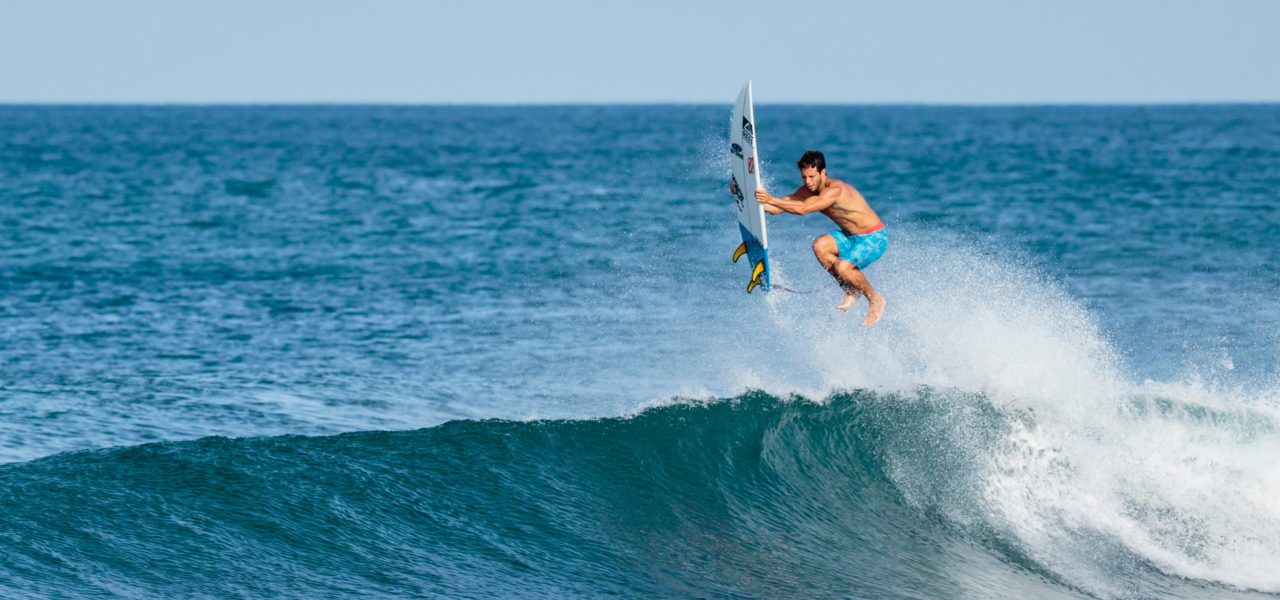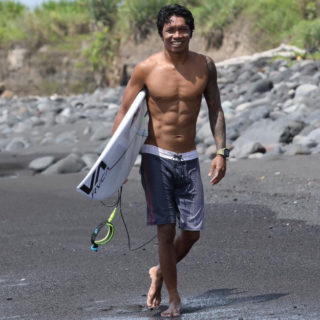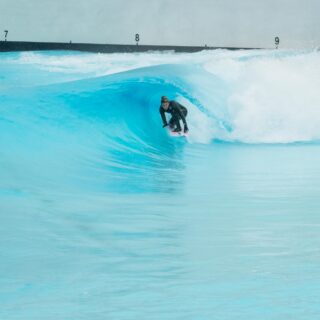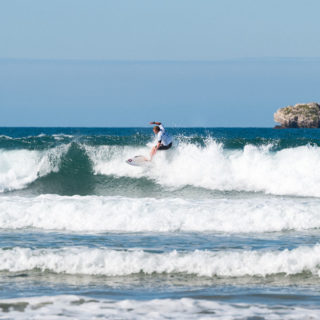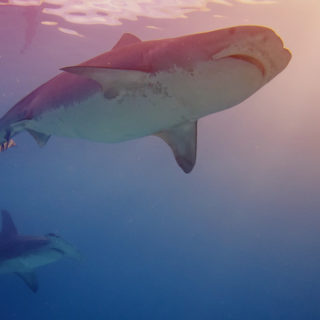Making money travelling and surfing the world? A dream only few of us dare to pursue. Simon Salazar is one of them. Energetic, determined and yet so humble, he knows exactly how to make the most out of every moment.
One would never guess that the Colombian pro surfer spent the first half of his life away from the ocean; he only started surfing at age 14. Three years later, in 2007, he won his first national title and in 2009, he finished 8th in the Latin American Tour. An important year, in which he managed to make a living just from surfing and competing internationally. Throughout the following years, Simon kept winning national titles back in Colombia but, unfortunately, wasn’t able to make it under the top 20 at the Latin American Tour again. The costs of competing internationally were high and it was hard to find sponsors, it thus seemed like Simon’s dreamy lifestyle was coming to an end.
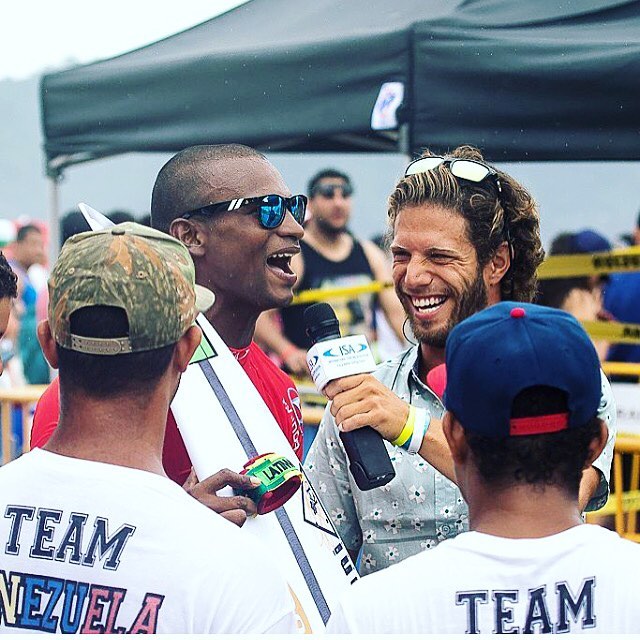
A competition in 2013, however, marked a decisive turning-point in the life and career of Simon. He — since then — has not only been competing, but he’s also been observing precisely, commenting on waves and other competitors and making sure the audience leaves the event with a big smile. Since 2014, Simon hasn’t missed a single event of the ISA: he’s been working as their broadcaster while surfing and travelling places like California, China or Japan — just to name a few. Simon is still part of the Colombian national surf team — he won the national title of 2017 — and is regarded as one of the main surfers of Latin American. Here’s the inspiring story of a passionate Colombian surfer, who dared to seize the opportunities given to him in life and who hasn’t stopped pursuing his dreams and passions since.
So Simon, what exactly happened in 2013?
I was at an event in Panama. I won my heat and got back to an interview. And then when I was doing the interview, all of the sudden I was like, ‘alright, now my turn.’ I grabbed the mic and I started to interview the guys. And they were like, ‘oh you’re kinda good.’ And then I stopped there, did my other heat but got second, so I didn’t get to do another interview and just went back to hang out with the boys. The director of the webcast, Mateo Rojas remembered me and asked me whether I wanted to help them out with the broadcast for the night and I was like, ‘yes sure’, I wasn’t going to do anything anyways and they were going to give me free food. (laughs)
What happened after?
After that, I asked the producer for feedback and then at the end of the day, the manager of the event came back to me. She told me that I was doing quite well and asked me to do broadcast for the next few days. And I was like, ‘yeah sure, I’m down.’ She said they were going to pay me for housing and everything. I was super stoked.
So wait, what was the exact name of the event?
It was the Reef Classic Pro Panama in Santa Catalina. And then, this is the best. After that, nobody knew that I was doing that, so every event I went to, I’d go to the broadcast station, introduce myself, tell them that I’d done the previous event and just ask them if I could help them out. Then, on the next event, I contacted them prior to the event, offering them my services as a broadcaster. Again, I wasn’t asking for money, I just wanted the housing, food and the fee to compete at the event. They agreed. So then, the next event I did the same but asked for the plane ticket as well. So after each event I’d ask for a little bit more and at the end of the year I was getting food, housing, ticket and a salary. One day I got contacted by the ISA. By a guy named Andres Mascaro. He said that they’d been watching me for 3-4 months and that they really liked what I was doing. So I got contacted by him and he gave me the contact of a guy called Carlos Escaba.
That sounds like a drug dealer.
(Laughs) Carlos Escaba was the Marketing and Media Manager of the ISA. So I had an interview with him and I was like..
Wait! How did that go?
I had an interview with him through Skype because the office was in La Jolla, California and I was in Colombia. So in the interview they asked me: ‘what’s your favourite surfer?’ ‘Kelly Slater’, I said. And then he asked me to name another one. So I said Parko (Joel Parkinson).
Then he asked me ‘what’s your favourite place to surf?’ and I was like, ‘man I would love to surf JB.’ Escaba said: ‘So Kelly and Parko are in the heat and they’ve got 5 minutes remaining. GO.’
I was like, ‘wait what?’
No way?!
So, I’m a fan of surfing, that’s why I’m doing this, right? So I got all the videos and events that I remembered in that very moment, put them together and talked about it for five minutes. I talked about the situation, the waves, the scores and at the end of everything Kelly Slater won (laughs).
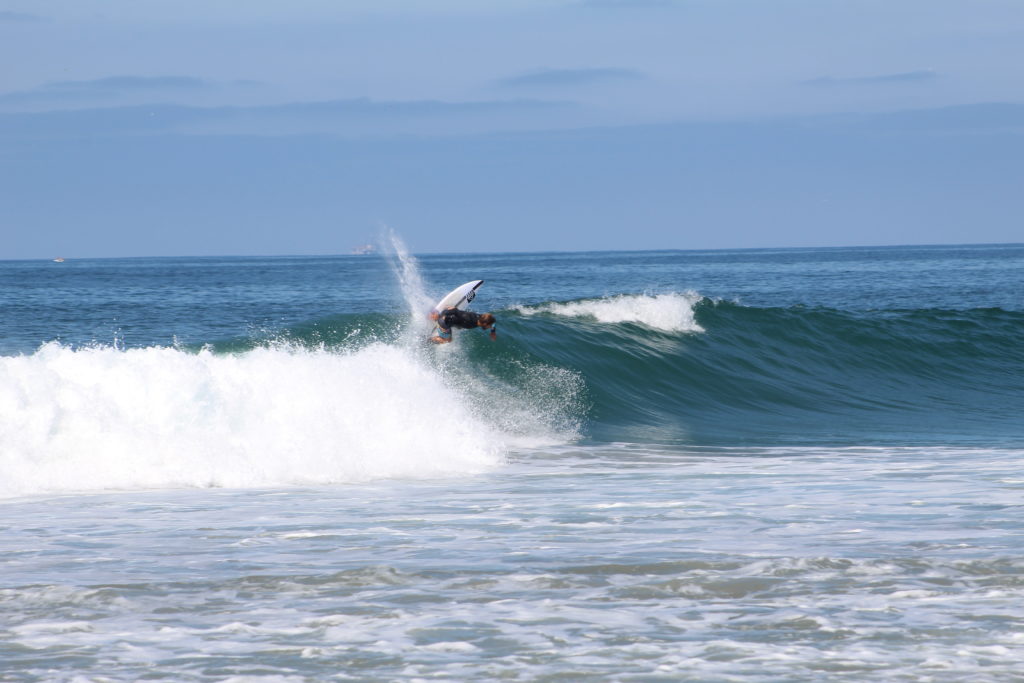
Obviously!
Yes! And then Escaba said ‘wow Simon that was pretty good, give me a couple of days and I’ll get back to you.’ And that’s how I started working for them. At first I was really concerned about whether I was doing it right or not because I just loved this job so much… But they liked what I was doing so they hired me again for the event next year.
So would you always get one job at a time or would you be hired for an entire year?
No it was one job at a time. Now they tend to hire the same people but before you never knew if you were going to get hired for another event or not. My first event was the Ecuador junior’s. The boss said that they would keep hiring me if I was doing well enough. So at the end of the event, after 10 days of working, Carlos Escaba came back to me and asked me: ‘how good are you at stand-up paddling?’, I was like, ’wait what…I do stand up paddling but I m not competing.’ They were like, ‘we want you to announce the next event.’ I said ‘yes sure, I know some’, I had no idea (laughs) and they were like, ‘alright, so see you in Nicaragua in 20 days.’ And since 2014, since then, I haven’t missed an event.
So at every event the ISA is hosting, you are their speaker?
Yeah. I’m either their web announcer or beach announcer. So I’m either the guy who talks to the crowd on the web or at the beach.

And what’s the most challenging part of doing this job? I mean, it’s all live right, and you’re constantly talking?
The hardest part is actually what I enjoy the most. Because you have to talk and at the same time you have to think. So you’re basically sending ideas to your mouth. As you are talking you have to create the story and go with the flow because…
You have to entertain people?
Exactly. I can be talking about the waves and then a graphic shows up on the screen but I have to keep going with the idea that I had initially while I was thinking about what was happening and then I team up with my partner. What we call this is we set the ball. For example, I will set a ball by talking about the quality of the waves and then my friend will elaborate on the ball I set.
Have you ever had a big screw up, where you fucked up? An embarrassing moment?
Everything! I got a webcast in English and then because of my accent, instead of saying ‘focus’ I said ‘fuck us’ for two days in a row.
Classic! (laughs)
That was the best. So we were ‘fucking’ each other for two days. (Laughs)
Any thoughts on the world surfing games in Japan this year?
Good question! Surfing’s been going through a gnarly situation after 2016, the announcement of surfing going to the Olympics. It’s really interesting because now that we’re an olympic sport there’s all sorts of reactions. It’s changing the stereotypical picture of surfers. Those guys are athletes, you have to train, you have to get into the water, train your mind, body and technique just like every other athlete, otherwise you just wont make it. It’s getting to a point where people are taking it more and more serious all the time and you can feel that.
If something could have been different at the world surfing games in Japan, what would it have been?
That the waves would have stayed the way they were on the first day. It’s always about the waves. But that’s the beauty of that sport, that a good surfer can perform on super good surf to really bad surf, to good surf or to bigger surf. But its impossible to hide that certain surfers belong to different kinds of conditions. Like when it’s over head, waist high, weak, hollow… you know already that the surf condition will be good for a specific surfer.
What did you specifically love about this year’s world champ?
The reception of the crowd, more and more people getting to the beach, more kids surfing, more people getting to understand and getting to appreciate this sport.
What do you think of Swiss surfers competing?
I think it’s amazing. The fact that it’s somewhere which has no surf culture at all and having already a team that is going to an event like this is going to motivate a lot of people.
Did you interact with any of the Swiss surfers?
Not this time.
There are people who think it’s kind of hard to compete at, for example, the Swiss Surfing Championship where you’ve got surfers who grew up at the beach but got a Swiss passport as well.
It’s gonna be harder but they’ve got the same rights. It’s not because they live somewhere else that they don’t have the right to compete for their country. Fair enough, they’ve got an advantage because they grew up in a place that has a lot of surf, but at the same time, that will only set the bar higher and thats it. Everyone is going to be better and it’s all about that, we just want people to be the best version of themselves.
Please end the sentence: Life without surfing..
Is like earth without water. It’s nothing, we can leave.
Would you rather never have sex again or never surf again?
Woooooow….
(Laughs)
Wooow… wooow…
(Laughs)
Woooooooow… I’d definitely give up on sex.
(Silence)
Anything else you’d like to say?
Yeah, the beginning of surfing is really hard to be honest. Like, the curve of learning is super slow at the beginning, so just keep it up and try to find your passion for being in the ocean because it’s all about enjoying the ocean, being by yourself, in nature and sometimes sharing this passion with friends.

Any tips you want to give to Swiss surfers that only surf during their vacations?
Yeah of course. Look for professional help. We’re getting to the point where we are changing that attitude, because before it was considered lame. But just as with any sport, if you’ve got a coach, someone who films you and takes pictures of you, you’re going to improve 3x faster.
Seek help.
Exactly. And you’re going to help other surfers like me to have jobs as well. (Laughs)
Sweet, that’s it.
Thank you.
